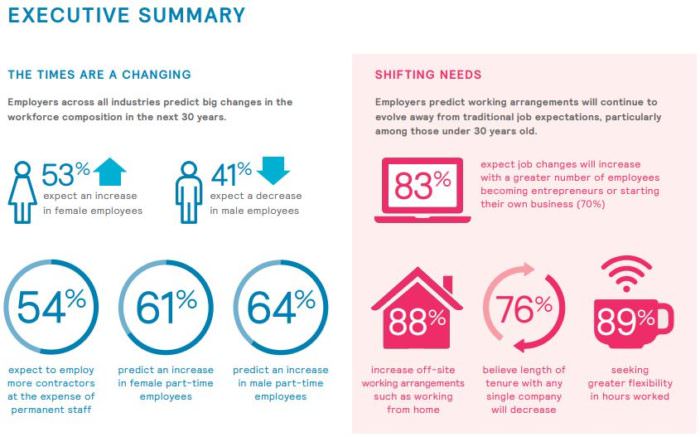Can the superannuation system designed a generation ago still be fit for purpose for the modern workplace and our ageing population? This was the question put to 80 business executives across a wide range of industries in Mercer’s recent survey and report: Keating’s super meets the digital natives/the next generation of super.
Changes in the modern workplace
Nine of the ten organisations surveyed agree that as the workplace transforms, so too must super. Mercer’s CEO, Ben Walsh said:
“The results indicate a seismic shift from the workplace of 1992, when full-time jobs were predominantly filled by men with few job changes. Contrast that with Generation Z, digital natives who will not only have multiple jobs, but multiple careers.”
Demographer, Bernard Salt, added:
"The nature of work has changed, as has the gender mix, the ethnic mix and the technology skills of the workforce. And yet, throughout these profound changes, the essence of superannuation has not changed substantially. Superannuation of the future needs to be portable both within Australian workplaces and even globally. It needs to be ‘pauseable’ so that women, and men, can come into and out of the workforce as they deem appropriate to their life choices. The next generation of super needs to reflect the agility, the diversity, the globalness, the lifestyle choices of Australians today, that indeed the workplace now recognises.”
The changes in the future labour force predicted by the 80 business leaders include 54% forecasting an increase in contractors at the expense of permanent staff and a sharp spike in part-time workers, both men and women.

Lack of engagement
The Mercer Report also highlights the differences in superannuation engagement by age. About 89% of employers think employees aged 60 years and over regard super as very important, compared with only with 8% of employees under 30 years. In fact, 56% reported that they didn't think super was important and only 23% said it was somewhat important. The Report provides many quotations from young people showing a complete lack of interest in super.
The following is predominantly extracted from Mercer’s report.
Despite super now having served a generation of workers, there is broad agreement that the system has failed to engage employees. According to those surveyed, employees don’t view super contributions as 'their money', with many unable to identify their fund or what it invests in. Not surprisingly, they fail to undertake any forward planning or consider super as part of their broader investment approach to retirement.
This trend will worsen in time, with younger workers in particular found to have little interest or engagement with the super system. Engagement only appears to occur closer to retirement, when it can be too late to optimise super savings. Competing financial priorities, a sense of a lack of empowerment in dealing with finances and financial institutions and difficulty in navigating a 'complex' system are among the main reasons cited for people’s disengagement with super.
Failure is an opportunity in disguise
While failure to engage super fund members is acknowledged as a major issue, it is an opportunity for vast improvement.
Survey participants think super is an underutilised lever when it comes to staff recruitment and retention, with the majority of employers not recognising its value when negotiating staff contracts, such as offering higher contributions or paying administration fees. Integrating super into staff entitlements can also serve to better educate and empower staff to actively manage their financial assets.
Communications to members are also viewed as opportunities to better engage members, particularly young workers, with current interactions criticised for being text heavy and lacking dynamism. While other industries had successfully used video, social media and humour to interact with their target audiences, the super industry is lagging.
While the bulk of members’ interactions with super funds shifts to online platforms, technology can further enhance member experiences through more widespread adoption of AI to anticipate and meet member needs, such as matching callers to customer service staff by age. AI is also seen as a way to trigger discussion about investment needs based on members’ life stages.
Linking super accounts to online bank accounts was considered another opportunity to keep super front of mind and incentivise saving and contribution targets. However, more traditional forms of communication still have their place. One suggested solution included employee workshops to demystify super and encourage members to be more active participants in their future saving strategy. Financial literacy should start earlier than the workplace, with widespread agreement that the government should update school curriculums to include 'financial health' alongside health and fitness, and sex education.
Distrust and disruption
The recent scrutiny of the financial services sector could further embed a sense of skepticism and detachment among fund members already feeling overwhelmed by a multi-faceted and regulated system. Current industry practices are partly responsible for contributing to wide-scale disengagement and apathy towards super.
The future workforce profile will not be a big enough impetus to trigger change in the system on its own. They also doubt recent 'disruptors' targeting millennial members through social channels and simpler product options can reshape an essentially government-controlled system, and that it would likely take the big-name funds to have large-scale impact to force significant change.
Businesses see a growing need for a new superannuation system to cater for the next generation. Superannuation providers, in turn, should view this as an opportunity to break away from an outdated system and lead the change.
Go to mercer.com.au/NextGenSuper to learn more.
Leisa Bell is Assistant Editor at Cuffelinks.